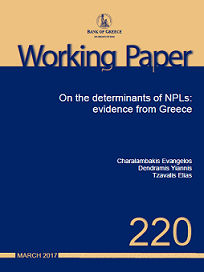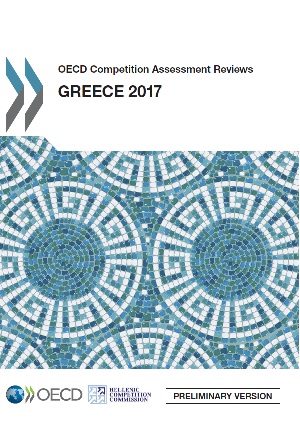Evangelos, Charalambakis, Yiannis, Dendramis, Elias, Tzavalis, (2017), “On the determinants of NPLs: evidence from Greece”, Bank of Greece Working Paper 220, March We investigate the relationship between non-performing loans (NPLs) and their fundamentals, mainly bank and macroeconomic variables. This is done based on aggregate portfolio loans in the Greek economy. Greece constitutes an interesting case to study the factors determining NPLs, given the pervasive recessionary conditions that have characterized it since …Read More
Euro area annual inflation down to 1.5%
Eurostat/Euro area annual inflation down to 1.5% , 31 March 2017 Euro area annual inflation is expected to be 1.5% in March 2017, down from 2.0% in February 2017, according to a flash estimate from Eurostat, the statistical office of the European Union. Looking at the main components of euro area inflation, energy is expected to have the highest annual rate in March (7.3%, compared with 9.3% in February), followed by …Read More
Greece: 2017 Economic Outlook
Monokroussos , Platon, (2017), “Greece: 2017 Economic Outlook”, Eurobank, 1 March Greece’s real GDP came in at -0.4% QoQ / +0.3% YoY in Q4-16 (quarterly national accounts, flash estimate), interrupting two consecutive quarters of positive QoQ growth (Q3: 0.9%; Q2: 0.3%). For the full-year, real output grew by 0.3%, broadly in line with our earlier forecast and compared with a -0.3% projection penciled in the 2017 budget. This translates into …Read More
Sovereign Rating Model: Greek Sovereign Rating Worse Than We Deserve
Lekkos, Ilias, Rotsika, Dimitria, Giannakidis, Haris, (2017), “Sovereign Rating Model: Greek Sovereign Rating Worse Than We Deserve”, Piraeus Bank Economic Research and Investment Strategy, February The profound effect of sovereign credit ratings on economic activity is all too well known in the case of Greece, where the downgrade of the Hellenic Republic to below investment grade led to the “financial isolation” of the Greek state from the global financial system. …Read More
Contrasting the views of the EU Institutions and the IMF staff on the outlook of Greek economy and the present bailout programme
Monokroussos, Platon, (2017), “Contrasting the views of the EU Institutions and the IMF staff on the outlook of Greek economy and the present bailout programme”, Eurobank, February The study presented herein has been motivated by the ongoing negotiations between the Greek government and the Institutions (EC/ECB/IMF/ESM) in the context of the 2nd review of Greece’s present bailout programme. It attempts to analyze important deviations and similarities in the views presented …Read More
Overview of the Greek Financial System
Bank of Greece, (2017), “Overview of the Greek Financial System”, January During 2016, the financial system’s principal risks seem to have stabilised, while the medium-term prospects will mainly depend on creating an environment favouring economic growth. However, there are still significant challenges, both in the domestic front, due to potential delays in the completion of the second review of the Third Economic Adjustment Programme for Greece, and structural factors (e.g. high …Read More
Insights on the Greek economy from the 3D macro model
Balfoussia, Hiona, Papageorgiou, Dimitris, (2016), “Insights on the Greek economy from the 3D macro model”, Bank of Greece Working Paper 218, 29 December This paper examines the macroeconomic and welfare implications of banking capital requirement policies and their interactions with real and financial shocks for the Greek economy. The model employed is that of Clerc et al. (2015), a DSGE model featuring a detailed financial sector, banking capital regulations and bank …Read More
Where did the Greek Bailout Money go?
Rocholl, Jörg, Stahmer, Axel, (2016), “Where did the Greek Bailout Money go?”, European School of Management and Technology, December This paper analyzes the flow of money for the different Greek bailout funds and concentrates on two key questions. First, where did the money come from? Second, where did the money go to? Finally, the paper discusses the findings in a broader context and derives policy implications. Figure 1 presents the …Read More
A Closer Look to External Trade: Greece’s Export Performance
Lekkos, Ilias, Leventakis, Artemis, (2016), “A Closer Look to External Trade: Greece’s Export Performance”, Piraeus Bank, 9 December Greece’s trade balance in terms of GDP has improved substantially in the last eight years (from 12.6% deficit in 2008 to marginal surplus of 0.1% in 2015), correcting one of the long-term macroeconomic imbalances of the Greek economy. However, this improvement was achieved through sharp import contraction taking into account that imports decreased …Read More
OECD Competition Assessment Reviews – GREECE 2017
OECD, (2016), “OECD Competition Assessment Reviews – GREECE 2017”, OECD Publishing, 7 November After suffering one of the longest and most serious economic crises ever experienced by any European country, which resulted in a severe drop of real GDP and major losses in employment and incomes, the Greek economy is projected to improve in 2016-2017. Progress has been made in balancing the budget and implementing significant labour market and fiscal …Read More






